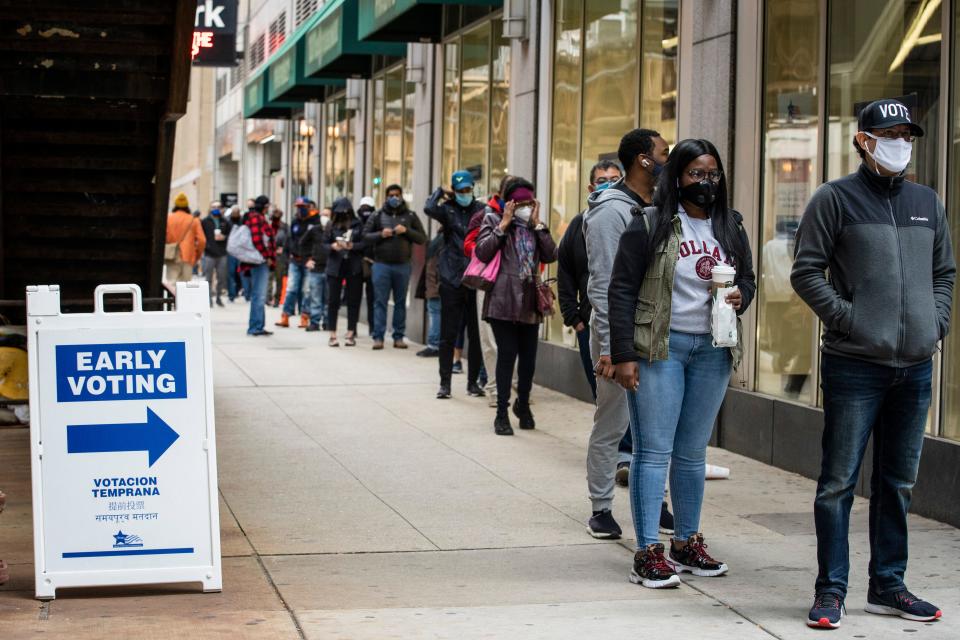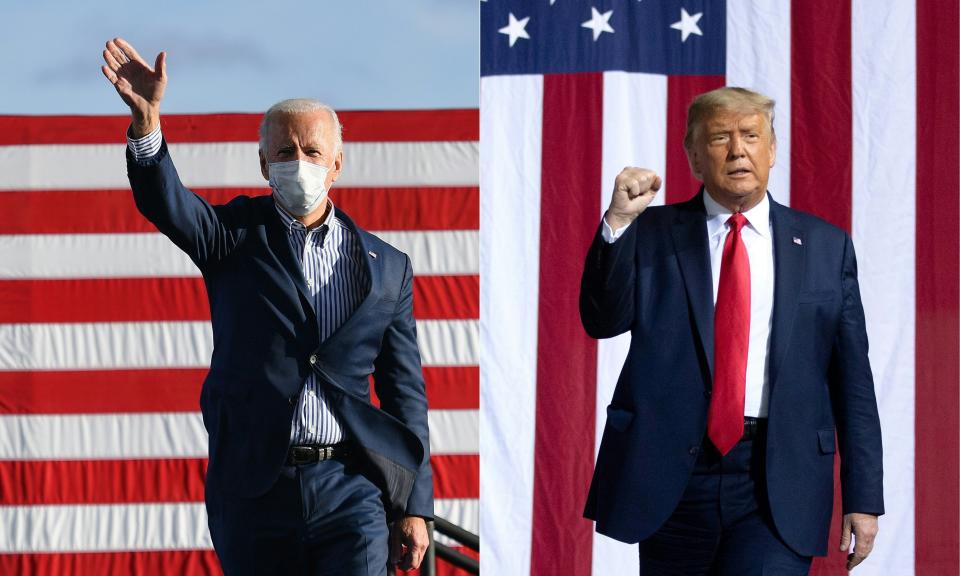A fiercely contested presidential election reinforced the nation's divide. What's next?
No blue wave. No rebuke of President Donald Trump as a four-year aberration. And even if a new Democratic president is sworn in, no new Washington.
As the final votes were being counted in key states, the most fiercely contested campaign in memory is deepening the picture of an electorate riven by age and race and gender, by what we do and where we live and whom we trust. The federal government is likely to remain divided, often a prescription for dysfunction.
That matters more than usual. If Democratic challenger Joe Biden wins, he will face the most serious crises of any president at the start of his tenure since Franklin Roosevelt took office during the Great Depression. The most deadly pandemic in a century is still surging across the country, rippling through every aspect of American life and leaving millions jobless. Even the anti-war protests Richard Nixon had to deal with in 1969 and the financial meltdown that confronted Barack Obama in 2009 pale in comparison.
'Not in a good place': Americans grapple with anxiety, fear one other while awaiting results

For Biden, victories declared Wednesday in Arizona and Wisconsin put him on the verge of an Electoral College majority that would deny Trump the second term in the White House he had sought. The former vice president already had bragging rights: He has received the largest number of votes of any presidential candidate in history, topping a 50% majority in an election marked by massive turnout.
No blue sweep and a polling miscue
But the blue sweep that Democrats had hoped would give them control of the Senate and bolster their majority in the House never materialized. Some had predicted that concerns about Trump's character and his handling of the coronavirus would prompt a broad rebuke of his leadership, even among those who had supported him before. That assumption turned out to be wrong, as did public polling before the election that showed Biden ahead in Florida and competitive in Ohio and Texas.
Polls showed Biden had a lead: Why didn't Americans wake up to a winner?

Instead, Trump held that trio of big states. The coalition that put him in the White House four years ago proved to be remarkably durable and the president himself unvanquished. He made unsubstantiated accusations of fraud, and his campaign filed lawsuits challenging the count in Michigan and Pennsylvania.
One big winner was Senate Majority Leader Mitch McConnell, who sailed to easy reelection in his home state of Kentucky. His party was favored to keep control of the Senate as endangered GOP incumbents in Iowa, Maine, Montana and South Carolina managed to hold on.
With Republicans in control, McConnell would be able to facilitate Trump's legislative agenda or to block Biden's agenda.
Under that scenario, Biden would be the first Democratic president since Grover Cleveland in 1884 to win the White House without Democrats also winning both chambers of Congress, a University of Virginia political tip sheet noted Wednesday. That surely would make governing more difficult.
The demise of the persuadable voter?
In remarks to reporters in Wilmington late Wednesday, Biden discussed the road ahead, saying that when the election was over it would be time for the nation to unite. "I know this won't be easy; I'm not naive," he said. "I know how deep and hard the opposing views are in our country on so many things. But I also know this as well: To make progress we have to stop treating our opponents as enemies."
From the start, Biden's campaign call was his promise to "heal" America, to return to a less polarized time. But Election Day surveys of voters showed partisan lines hardening as the number of persuadable voters shrank.
In surveys of voters Tuesday by Public Opinion Strategies, a leading Republican polling firm, a startling 81% of voters said their minds were made up before the fall campaign even began. That's 20 percentage points higher than four years ago. Only one in 10 said they didn't make up their minds until at least last month; in 2016, one in four had been undecided until then.
Demographic divides were sharp. White voters supported Trump by 11 points; voters of color backed Biden by more than 3-1. Rural residents supported Trump by 2-1; city dwellers backed Biden by 3-1. Voters in midlife, ages 45 to 59, supported Trump by 11 points; those under 30 backed Biden by nearly 3-1.
White women with a college degree supported Biden by 27 points. White men without a college degree backed Trump by a stunning 40 points.
Almost no one crossed party lines: 94% of Republicans voted for Trump; 93% of Democrats voted for Biden.
To the surprise of the punditry, which got a comeuppance only somewhat less jarring than four years ago, Democrats are the ones who face a debate over what to blame for the election's disappointments and where the party should go next.
Of particular surprise and concern to Democrats were gains Trump made among Latinos. "A catastrophic erosion," said David Wasserman of the nonpartisan "Cook Political Report," and one that helped Trump carry Florida and Texas Republican members of Congress hold seats that were seen as threatened. He predicted the GOP were on track to gain five to 10 House seats.
'A gut-check moment'
Democrats have long argued that inexorable demographic forces were on their side. They once again showed disproportionate support among groups whose shares of the population are growing in an increasingly diverse nation. In contrast, Trump's base is grounded among groups that are not, including white men and those without a college education.
Yet Trump still made a race of it, and his transformation of the Republican Party is in his image is unchallenged.
"A gut-check moment," said Claire McCaskill, a former Democratic senator from Missouri, speaking on MSNBC hours after the polls had closed. "We can't go back to assuming just because we think Donald Trump is an outlier in terms of what this country represents and who he is and how he behaves, that he is not connecting with a lot of the American people."
This article originally appeared on USA TODAY: Trump and Biden election: Presidential race reinforces nation's divide

